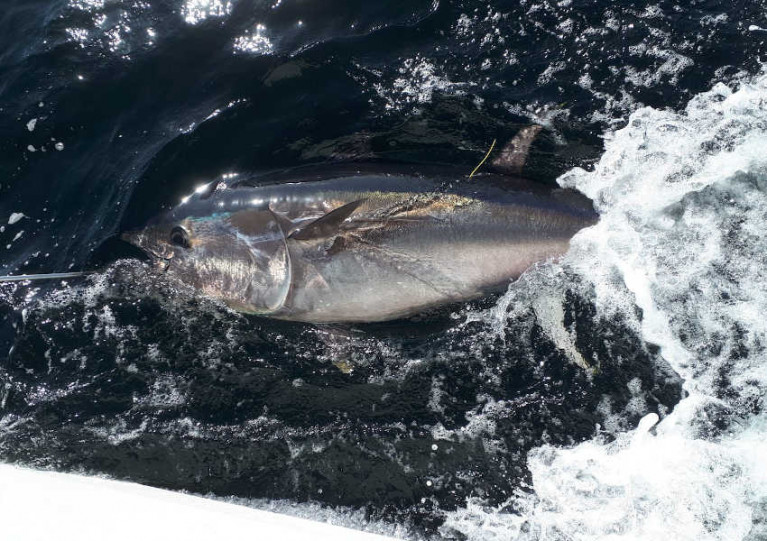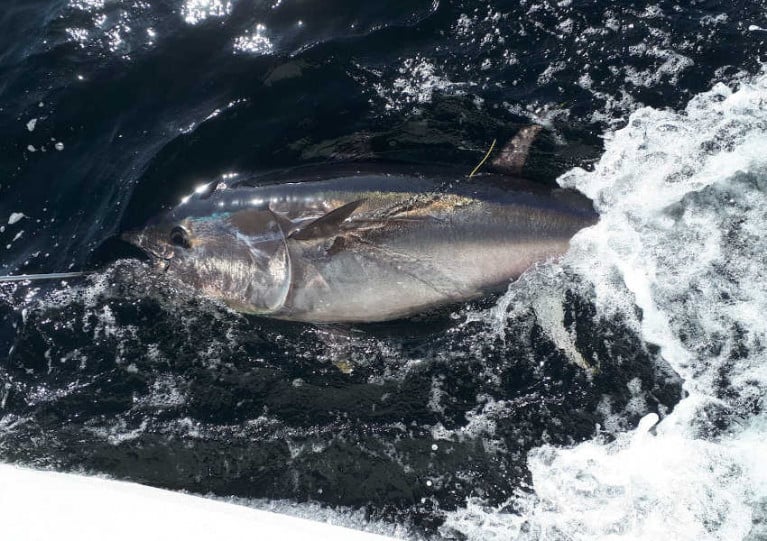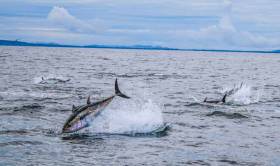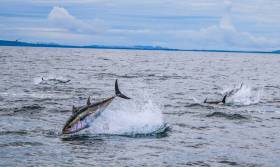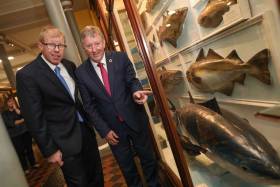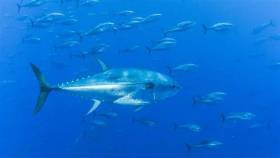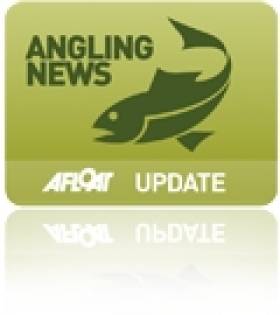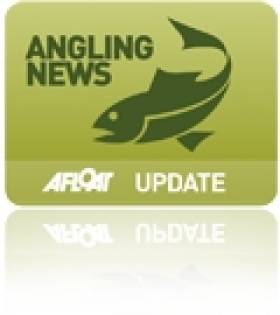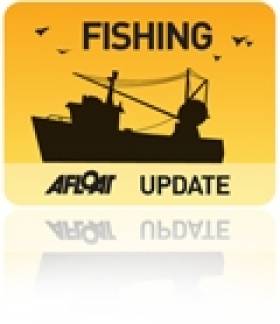Displaying items by tag: Bluefin Tuna
Twenty-two charter angling vessels have been granted authorisation to participate in a bluefin tuna data collection programme after a successful pilot last year.
The Tuna CHART (CatcH And Release Tagging) programme will see skippers catch, tag, measure and release Atlantic bluefin tuna for data collection purposes off the Irish coast.
The authorised vessels, which are located in Cork, Clare, Galway, Sligo and Donegal, will support an international scientific programme to increase knowledge of the behaviour and abundance of bluefin tuna in Irish waters and across its distribution generally.
Atlantic bluefin tuna, the largest tuna in the world, frequent Irish coastal waters to feed during the species’ annual migration through North Atlantic waters.
The bluefin tuna is prized by sea anglers for its power and fighting ability and is a very valuable commercial species, though there is currently no sport or commercial fishery for bluefin tuna in Ireland.
The new programme, which has been developed by Inland Fisheries Ireland and the Marine Institute in partnership with the Sea Fisheries Protection Authority and the former Departments of Agriculture, Food and the Marine, and Communications, Climate Action and Environment, will operate again in 2020 having commenced on a pilot basis in 2019.
Eamon Ryan TD, minister with responsibility for inland fisheries, said: “The 22 angling vessels authorised by my department, increased from 15 last year, will contribute substantially to essential bluefin tuna data collection as they migrate along the Irish coastline.
“The recreational fisheries sector is crucial in the delivery of this research programme and we look forward to continue working with all the State agencies involved.
“I want to acknowledge the key role of the authorised charter skippers and their crews who are bringing their unique expertise to bear on providing valuable data for scientific purposes, and the ‘citizen scientist’ anglers who will catch the fish. The fact that 209 fish were tagged last year with no mortalities is a great achievement by the skippers.”
The Sea Fisheries Protection Authority and Inland Fisheries Ireland will undertake inspections and patrols around the coast to ensure this remains a strictly controlled programme.
A full list of authorised skippers can be found at www.fisheriesireland.ie/bluefin
Building on the success of last year’s Tuna CHART (CatcH And Release Tagging) pilot programme, a bluefin tuna research catch-and-release fishery for Ireland will operate in 2020.
A maximum of 25 authorisations may be granted to qualifying angling charter vessel skippers around the Irish coast for this fishery which will open on Wednesday 1 July and close on Thursday 12 November, without exception.
And depending on the successful operation and review of this year’s fishery, it is intended that a scientific catch and release fishery may also operate in 2021 and 2022.
Atlantic bluefin tuna, the largest tuna in the world, frequent Irish coastal waters to feed during its annual migration through North Atlantic waters. The bluefin tuna is prized by sea anglers for its power and fighting ability and is a very valuable commercial species.
The Tuna CHART programme is a collaborative scientific programme between Inland Fisheries Ireland (IFI) and the Marine Institute in partnership with the Sea Fisheries Protection Authority, the Department of Agriculture, Food and the Marine (DAFM) and the Department of Communications, Climate Action and Environment (DCCAE).
In 2019, the Tuna CHART pilot programme authorised 15 charter skippers to operate a scientific fishery, in which anglers participated fully, to catch, tag and release bluefin tuna.
These professional skippers were trained to tag, measure and record bluefin data and over the course of the 2019 three month season, 219 bluefin tuna were caught, tagged and released. As many as eight bluefin were tagged on one fishing trip.
All tuna were carefully handled subject to strict guidelines set by the Tuna CHART programme and all were released alive. Data from the tagging programme are being collated by the partnership for reporting to the International Commission for the Conservation of Atlantic Tuna (ICCAT).
As with the pilot programme, this year’s authorised skippers will be required to have high specification rods, reels and line in advance of the open season in order to bring the fish alongside in a timely manner. Skippers will be required to collect data on every bluefin trip undertaken and each bluefin tuna they catch, tag and release.
A call for applications for the 2020 fishing season will be announced next Tuesday 18 February and the last date for the receipt of a completed application will be 1pm on Friday 6 March.
Bluefin Tuna Catch and Release Tagging Pilot Programme Extended
While there is no sport or commercial fishery for Bluefin tuna in Ireland, a pilot Bluefin Tuna Data Collection Programme has been developed by Inland Fisheries Ireland (IFI) and the Marine Institute (MI) in partnership with the Sea Fisheries Protection Authority (SFPA) the Department of Agriculture, Food and the Marine (DAFM) and the Department for Communications, Climate Action and Environment (DCCAE) . This programme, comprising 15 authorised charter angling skippers, commenced on the 15th of August in order to catch, tag and release Atlantic bluefin tuna for data collection purposes off the Irish coast and is part of the International Convention on the Conservation of Atlantic Tuna (ICCAT) research programme which is supported by the EU Commission.
These authorised skippers with vessels operating out of ports located in Cork, Clare, Galway, Sligo and Donegal are supporting scientific work to increase knowledge of the behaviour and abundance of Bluefin tuna in Irish waters. All authorised skippers have participated in training with guidance provided around fish handling, welfare, tagging and data recording. Participants in the programme catch, tag and release Bluefin tuna while adhering to strict fish safety and handling procedures at all times.
Authorisations were originally granted to the 15 charter skippers from mid-August until mid-October. This pilot project has been very successful with 201 fish tagged and released to date with utmost consideration to their welfare. Due to the migratory patterns of Bluefin tuna, there has been little activity in the South and South West. As a result, the fishing season will now be extended for a further four weeks until the 12th of November to seek data which will help improve our knowledge of the population structure and distribution of Bluefin tuna in these regions. There will be no further extensions as lower water temperatures could hinder post-release survival of these fish after mid-November.
Minister Creed said today: “I am delighted by the excellent cooperation shown between my Department, DCCAE, SFPA, MI and the IFI in the development and management of this pilot project. The extension of the programme will provide an opportunity to gather further data and improve our understanding of the migratory patterns of Bluefin Tuna around our coasts.”
Minister Canney said: “I fully support the continued involvement of my Department and Inland Fisheries Ireland in the collaborative pilot project to collect valuable data on Bluefin tuna in Irish coastal waters. The partnership approach has led to a very successful round of data gathering with some 200 fish tagged and recorded since the pilot programme opened.
“The extension of the programme for a further four weeks will provide an excellent opportunity to encourage the collaborative effort and most importantly provide a research dividend by increasing the data collected. I have approved the issuing of renewed authorisations by my Department for the sea angling vessels participating in the initiative to continue until the 12th of November” he added.
The Sea Fisheries Protection Authority and Inland Fisheries Ireland will undertake inspections and patrols around the coast to ensure this remains a strictly controlled fishery. Anglers wishing to engage in this fishery must only do so on a sea angling vessel specifically authorised to participate in the pilot programme. Any person engaging in this fishery on any vessel which is not appropriately authorised will be in breach of the Sea-Fisheries and Maritime Jurisdiction (Bluefin Tuna) Regulations 2019 (S.I. No. 265 of 2019).
A full list of authorised skippers can be found here
Fifteen angling vessels will soon be granted authorisation to participate in Tuna CHART (Catch and Release Tagging), a pilot Bluefin Tuna Data Collection Programme.
As previously reported for Afloat.ie by Lorna Siggins, the programme will see the 15 authorised vessels catch, tag and release Atlantic bluefin tuna for data collection purposes off the Irish coast.
These vessels, which are located in Cork, Clare, Galway, Sligo and Donegal, will support scientific work to increase knowledge of the behaviour and abundance of bluefin tuna in Irish waters — which currently do not host a sport or commercial fishery for the species.
The new programme, which has been developed by Inland Fisheries Ireland (IFI) and the Marine Institute in partnership with the Sea Fisheries Protection Authority (SFPA), the Department of Agriculture, Food and the Marine and the Department for Communications, Climate Action and Environment (DCCAE), will operate on a pilot basis this year.
Authorisations will be granted from mid-August until mid-October, and all skippers and trained crew have participated in training with guidance provided around fish handling, welfare, tagging and data recording.
Participants in the programme will catch, tag and release bluefin tuna while adhering to strict fish safety and handling procedures at all times.
Marine Minister Michael Creed has welcomed the initiative. “My department has been working on this project for two years at both EU and domestic levels and I am happy to announce the commencement of the project this month,” he said.
“This initiative will allow the Marine Institute and Inland Fisheries Ireland to collect valuable data on the migratory patterns of bluefin tuna in Irish waters in a tightly controlled environment.
“This project has been a wonderful example of co-operation between my department, DCCAE, SFPA, IFI and the Marine Institute and I am looking forward to the continued development of this relationship.”
Sean Canney, Minister with responsibility for inland fisheries, added: “The angling vessels which will be receiving authorisation from my department will contribute in a very tangible way to important data collection around Bluefin tuna as they migrate past the Irish coastline.
“The recreational fisheries sector is crucial in the delivery of this pilot programme and we look forward to working with all the State agencies involved and critically with the skippers and their crews who have received authorisations in providing valuable data for scientific purposes.”
The SFPA and IFI will undertake inspections and patrols around the coast to ensure this remains a strictly controlled fishery.
Anglers wishing to engage in this fishery must only do so on a sea angling vessel specifically authorised to participate in the pilot programme. Any person engaging in this fishery on any vessel which is not appropriately authorised will be in breach of the Sea-Fisheries and Maritime Jurisdiction (Bluefin Tuna) Regulations 2019 (SI No 265 of 2019).
The rapid swimming migratory Atlantic bluefin tuna may be targeted by a limited number of Irish recreational craft under a pilot scientific research programme run by several State agencies writes Lorna Siggins.
Inland Fisheries Ireland (IFI) and the Marine Institute are seeking expressions of interest from up to 15 sea angling vessels, which would be authorised to run a catch, tag and release programme to collect data on the movements of the fish for the first time.
Atlantic bluefin tuna is the largest tuna and takes in the Irish coastline on its migratory track between the Mediterranean and the central Atlantic. It can reach a weight of over 600 kg, and over three metres in length, and can live for over 30 years.
Under International Commission for the Conservation of Atlantic Tunas (ICCAT) rules, Ireland could not allow targeted angling of bluefin tuna for data collection.
Last year, a European Commission audit had criticised the State for a “complete lack of control” over the illegal capture of bluefin tuna by sea anglers off the west coast.
It cited IFI evidence that a “targeted” recreational fishery for bluefin tuna had developed along the west coast of Ireland, with “numerous chartering companies advertising trips for tourists over the internet”.
The audit said there was evidence that some catch was being kept, landed and offered for sale in breach of regulations, given that Ireland had no quota.
However, IFI says that changes secured by Ireland at an ICCAT annual meeting last year will allow limited targeting of the species by recreational anglers, but for scientific purposes only.
The new pilot programme is being developed in partnership with the Sea Fisheries Protection Authority (SFPA), the Department of Agriculture, Food and Marine and Department of Communications, Climate Action and Environment.
Minister for Marine Michael Creed said he warmly welcomed the new pilot programme which would “build on and complement the extensive scientific work undertaken in recent years by the Marine Institute” and “increase our knowledge of the behaviour and abundance of bluefin tuna in the waters off the Irish coast”.
Applicants for the new data collection pilot programme will be assessed on the basis of previous experience in undertaking “collaborative research and scientific work”, and must have a minimum of five years’ experience of sea angling in Irish waters.
Applicants must also have experience in targeting large pelagic fish, and be equipped for same, and be willing to operate under specific authorisation controls, IFI says.
Authorisations will be valid from mid-August until mid-October of this year, IFI says, and strict fish safety and handling procedures will have to be followed at all times.
Training will be required in fish handling, welfare, tagging and data recording, and all vessels will be monitored by fisheries observers, IFI says.
Both IFI and the SFPA will “undertake inspections and patrols around the coast”, it says, and “any unauthorised skippers found targeting bluefin tuna will be prosecuted”.
It says anglers may participate in the fishery by booking places on an authorised vessel, and full details of the programme are on.
Irish Anglers to Participate in Data Gathering for Bluefin Tuna
Minister for Agriculture, Food and the Marine, Michael Creed T.D., today announced that he has secured approval at EU and international level for the introduction of a science-based catch, tag and release fishery for Bluefin tuna for Irish recreational anglers. This scheme will complement the work on satellite tagging of bluefin tuna that is being undertaken by the Marine Institute.
Minister Creed said that “As part of the negotiations on the new international management plan for bluefin tuna in the east Atlantic, Ireland was able to secure an agreement that will allow countries like Ireland, that do not have a commercial Bluefin tuna quota, to operate a catch-tag-release fishery for gathering scientific data.” This new management plan was adopted at the 2018 International Commission for the Conservation of Atlantic Tunas (ICCAT) Annual Meeting.
Minister Creed continued “My Department is currently working with the Marine Institute and the Sea Fisheries Protection Authority on a pilot project that will allow up to 15 angling vessels with trained tagging operators to target bluefin tuna in 2019. This aim of the project is to build on work undertake to date and to increase our knowledge of the behaviour and abundance of BFT in the waters off the Irish coast. It will also provide an ancillary benefit in that it will support angling tourism in peripheral coastal communities, including in particular Donegal.”
Previously, under ICCAT rules, Ireland could not allow targeted angling for bluefin tuna as we do not have a bluefin tuna quota. The changes secured by Ireland will now allow targeting for tagging purposes only by recreational anglers.
Minister Creed added “Our fishing industry has expressed concerns about the increasing numbers of Bluefin tuna in the Irish 200 miles zone and this programme will allow us to understand more about blue fin tuna - their habitat, migration patterns and concentration in waters around Ireland.”
The exact details of the pilot scheme will be developed over the coming period in consultation with the Department of Communications, Climate Action and Environment which is responsible for angling.
Donegal TD Pushes Minister To Raise Issue Of Bluefin Quota With EU
#Bluefin- A Donegal TD's push for a bluefin tuna quota for local game anglers has prompted a meeting between Marine Minister Simon Coveney and the EU Fisheries Commissioner.
According to Donegal Now, Thomas Pringle TD has welcomed the move to request a three-tonne quota for bluefin "despite the fact that I’ve brought this proposal before the Dáil on a number of occasions over the past year".
As previously reported on Afloat.ie, Inland Fisheries Ireland said that any initiative to develop a catch-and-release fishery for bluefin in Irish waters would demand struct protocols and reporting to the International Commission for the Conservation of Atlantic Tunas (ICCAT).
But the independent Dáil deputy says recreational angling for bluefin tuna "could bring huge potential for Donegal in terms of job creation and boosting tourism in the region".
Donegal Now has more on the story HERE.
Bluefin Tuna Recreational Fishery Remains Closed for the 2014 Season
#bluefintuna – Sea anglers and charter boat skippers are reminded that the Bluefin Tuna recreational fishery remains closed in 2014. Inland Fisheries Ireland (IFI) and the Sea-Fisheries Protection Authority (SFPA) have released updated information in relation to the recreational catches of Bluefin tuna in Ireland. European fisheries regulations governing the catching, landing and sale of Bluefin tuna direct states that unless a Member State has specifically assigned a portion of their annual national quota to sports and recreational fisheries to target these fish no such fishing can take place.
Current Bluefin Tuna fisheries management regulations (EU Reg 302/2009 and International Commission for the Conservation of Atlantic Tunas( ICCAT) Recommendation 12-03) stipulate that recreational and sport fisheries may be facilitated by Member States by allocating a specific national Blue Fin Tuna quota to the sectors, but because Ireland does not have a quota the EU has advised that a specific recreational fishery cannot be operated.
Dr Ciaran Byrne, CEO of IFI said: "IFI is supportive of hard-pressed coastal communities and the marine sector in particular and are aware of the economic boost which recreational angling can bring to such peripheral communities. In this regard, IFI continues to actively investigate the possibility of operating a recreational bluefin tuna catch and release fishery."
Any initiative by IFI to develop a catch and release fishery for recreational fishers in Irish waters will demand strict catch-and release protocols with obligatory catch logging and reporting to the International Commission for the Conservation of Atlantic Tunas (ICCAT). Such a proposal from Ireland will need the input and support of Ireland's regulatory maritime agencies to prepare a submission for consideration by the Scientific Committee ICCAT and the European Commission.
In the meantime, any Bluefin Tuna mortalities arising from fish accidentally caught in the course of angling must be notified to SFPA who are charged with the enforcement of the above regulations. The fish will be confiscated and disposed of.
Susan Steele, Chair of the SFPA said: "Ireland does not have a direct fishery for Bluefin Tuna in Ireland. Ireland does have a 1% by catch of Bluefin Tuna as part of the Northern Albacore fishery. The vessels that partake in the Northern Albacore fishery must obtain a specific fishing authorisation from the Department of Agriculture, Food & Marine. For anyone engaged in sports or recreational sea angling this means that if a Bluefin Tuna is caught while sea angling it has to be immediately released as the fish cannot be targeted or landed by an Irish boat."
Bluefin Tuna Anglers Should Put Conservation First
#Angling - Inland Fisheries Ireland (IFI) has urged marine sport anglers to put conservation first when it comes to the endangered bluefin tuna - particularly those in the tuna hotspot of Donegal Bay.
In a statement, the national fisheries body said: "For a long time, Ireland has been recognised for its marine sport fishing. The vast variety and quality of our angling has given the country a reputation of which we are justly proud."
Bluefin tuna catches by the commercial fishing fleet targeting other species were first reported in the 1980s, and such reports became quite common on the west coast by the mid 1990s, though no fish fell to rod and line until 2000.
The following year, a new Irish and European record was set by Adrian Mulloy, fishing with skipper Michael Callaghan. On the 5 October 2001 Adrian caught a fish of 968lbs near Rathlin O’Beirne Island.
In 2002 and 2003, more bluefin tuna were caught and one boat contributed to the 'Tag a Giant' programme run by Stanford University and supported in Ireland by Bord Iascaigh Mhara (BIM).
"While these were heady days for big game fishing in Ireland, it all happened against the backdrop of a global decline in a species that is now famously threatened by overfishing," said IFI.
In 2012, European regulations governing the harvesting of bluefin tuna were changed as the species became even more endangered.
Ireland does not have a bluefin tuna quota, and for this reason "no allocation is available for sports or recreational fishing," said the IFI statement. "Furthermore, there is no facility in Irish fisheries regulations to permit angler-caught bluefin tuna to be landed into any Irish port, and there is no provision for the sale of these fish.
"While IFI would love to see the development of a sustainable fishery for this wonderful species, given the continued significant decline of the species and the fragile nature of the stock, the key imperative has to be one of conservation."
Giant Bluefin Tuna Caught Off Kerry, Cork Coasts
#FISHING - Dingle fishermen trawling for tuna off the south-west coast of Ireland found a big surprise in their nets this week in the form of an enormous 2-metre-long bluefin.
As The Irish Times reports, the Atlantic bluefin is considered one of the big game fish and is highly sought-after for top-quality sushi, a demand that has led to its adding to the endangered species list.
Strict quotas have been placed on bluefin for fishermen who normally trawl for albacore tuna - but the Dingle boats Fiona K and the Atlantic Venture were lucky that their unexpected catch was within the 1% they are allowed each year.
The 140kg tuna is set to end up in shops and restaurants in Dingle and throughout Kerry for much less than one would pay for such fish in Japan, where a bluefin double the size went for over €600,000 earlier this year.
Meanwhile, an even bigger bluefin was snappped up by eager fish lovers at Limerick's Milk Market last weekend.
The 250kg goliath was caught 600 miles off Castletownbere in Co Cork by local fisherman JD Sullivan, according to the Limerick Leader.
“The tuna migrate up the west coast of Ireland around this time of year, but very few of them are caught,” said Paul Cusack of Rene Cusack’s fish shop in the market.
It's leading some to question if there's something in the water, with news from Angling Times of a giant 189lb common skate recently caught off the coast of Northern Ireland.




























